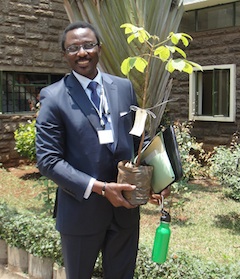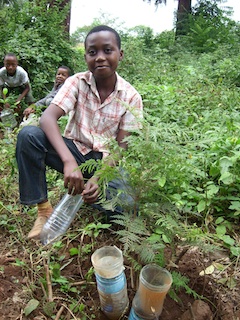UNEP says working with faiths is "top of our priorities" in Africa
September 18, 2012:
 |
 |
 |
UNEP director and Regional Representative, Mounkaila Goumandakoye |
Working with religions will go to the top of United Nations Environment Program agenda in Africa, UNEP Regional Representative for Africa said today.
“I really realised, just coming this morning that we could be more successful, we could be more relevant to the needs and aspirations of the continent, we could have more impact in all African countries if we can work with you [the faiths] hand in hand,” said UNEP director and Regional Representative, Mounkaila Goumandakoye, speaking off the cuff at a gathering of more than 50 senior African faith leaders, launching 26 long-term environmental plans.
“And I think this is one area definitely that I will make sure we put it top of my priorities,” Mr Goumandakoye added.
The Christian, Muslim and Hindu traditions launching these strategic action plans represented more than 184 million followers in some of the most environmentally threatened parts of the planet.
They come from Cameroon, Ethiopia, Ghana, Kenya, Nigeria, Rwanda, South Africa, Tanzania, Uganda and Zimbabwe cover a wide range of ecological activities including planting millions of trees, setting up TV stations and programmes, holding Environment Days, making teaching of such subjects both widespread and interesting, and protecting local wildlife.
Dr Ali Mohamed, Permanent Secretary of the Ministry of Environment and Mineral Resources endorsed his belief in the key role religions should and can play in protecting the planet:
“We in the Ministry of Environment are particularly encouraged that an Alliance between religions and conservation exists to assist in the response to challenges of global environment,” he wrote in a statement read by his colleague Richard Mwendandu, Director of Multilateral Environmental Agreements, Ministry of Environment and Mineral Resources.
 |
 |
 |
Tanzanian schoolchildren from the Evangelical Lutheran Church must plant ten trees before they can be confirmed. |
“The basic tenet for all faiths is generally deep respect for God’s creations and the appreciation of the delicate balance and harmony that exist in the functioning of the universe as established by the Creator… To this end, Religious leaders and Environmental Ministries and Organisations are natural allies who should always work together,” the permanent secretary added.
“Maybe it’s a new awakening,” Mr Mwendandu said in an interview.
The faith plans have taken around 18 months to put together with the assistance of the UK-based Alliance of Religions and Conservation (ARC). This NGO was started by HRH Prince Philip in 1995 with the specific hope that faiths might help protect animal species from extinction – because protecting Creation is part of the teachings of each faith.
Acting Ambassador for Norway, Elin Bergithe Rognlie attended the launch. “The Alliance of Religions and Conservation provides an example for others to follow in a world too often marked by religious tension and conflicts,” she said.
She drew attention to the women-led tree nurseries in Tanzania and Uganda, the training in sustainable agriculture in Ethiopia, Nigeria and Rwanda, the environmental education programs in Kenya and Ghana: Norway has been a major donor in the creation of these long-term plans and the ambassador said she could forsee that this could continue to be a major area in which Norway works with ARC and the faiths.
The Methodist Church in Kenya with three million members, a university, major hospital and 533 schools, has drawn up a long-term environmental plan. It has committed to set up an Intensive Agricultural Training Centre to train in environmentally friendly and sustainable farming techniques, and will also organize creation awareness courses in schools and on radio programmes.
“The initiative to draw an environmental policy for our church was born following a conference with ARC in 2011 in Nairobi,” said presiding bishop of the Methodist Church in Kenya Rev Fr Stephen Kanyaru M’Impwii.
“In response I felt convicted that Gods’ call is for us to be caring over all that he has given us according to his wisdom and that our failure (sin) has lead to destruction, poverty and death of many. We therefore, as God’s children, must arise to our God-given responsibilities.”
Further north, the Ugandan Muslim Youth Assembly has concentrated on forest and tree planting, with 50,000 trees planted in the past two years, and more than 700,000 trees planned for the next two.
Immam Ibban Iddih Kasozi explained that people are cutting down trees for construction, furniture, and fuel: “Wood is the biggest fuel source in Uganda,” he said. “The only way of ensuring there is wood for the next generations is to do this programme.”
“Our community believes in community work. All is jama, all is congregation: we believe that everything that we do is a prayer: this is why we have undertaken this plan.”
Elimringi Abraham Maringo from the Northern Diocese of the Lutheran Church of Tanzania said a whole generation had grown up never planting a tree and they were the ones cutting the trees down. That is why all faith groups should engage young people in nurturing the care of trees so that this generation loves trees and sees them as their responsibility. The church plans to plant 8.5 million trees.
ARC’s head of Africa projects Alison Hilliard said it was inspiring to see all the extraordinary work being done by faiths in Africa. “I have been working on these programmes for many years, and I am constantly surprised and moved by the creative and energetic responses from faiths. Each plan is different, according to what the faith can do, and sees is important. I look forward, many years into the future, to seeing the fruits of these extraordinary initiatives being launched today.”
The programme emphasised the centrality in all faiths of thanksgiving and celebration for creation; it included singing and a chanted poem from the choir of All Saints Cathedral Primary School and the girl’s choir from the Muslim Academy, Nairobi.
Click here to download this press release.
Link here for the ARC Flickr photostream, including photographs from the Nairobi event.
Click here to download a free pdf copy of the full 'Many Heavens, One Earth, Our Continent' brochure of long-term faith commitments.
Click here for information about the many different African faith groups making long-term commitments at 'Many Heavens, One Earth, Our Continent' in Nairobi, Kenya.
Click here to learn more about the Alliance of Religions and Conservation (ARC).
FURTHER QUOTES:
-- Mounkaila Goumandakoye (from written speech)“The commitments of the faith groups in environment conservation for human well-being are among the most important driving forces for positve change as humanity is grappling with challenges of colossal consequences.
“Self-interest of man, egoism of nations seems to shape the agenda. I am personally convinced that we have not succeeded in reversing some of the trends of environmental degradation because we fail to look at the issues through the lenses of spirituality, morality and faith. I am convinced that the responsibility taken by the faith groups, the long term commitments for a living planet of the faith groups will help shape the beliefs, behaviour and actions for a greener and better Africa.”
-- Statement by Dr Ali D Mohamed, Permanent Secretary, Ministry of Environment and Mineral Resources (his statement was presented by Richard Mwendandu, director Multilateral Environmental Agreements, Ministry of Environment and Mineral Resources)Kenyans are religious people, and I have no doubt that messages from such a meeting will resonate well with most Kenyans. We in the Ministry of Environment are particularly encouraged that an Alliance between religions and conservation exists to assist in the response to challenges of global environment.
The basic tenet for all faiths is generally deep respect for God’s creations and the appreciation of the delicate balance and harmony that exist in the functioning of the universe as established by the Creator… To this end, Religious leaders and Environmental Ministries and Organisations are natural allies who should always work together. Environmental conservation is usually about moral values.
Conservation of water catchment areas and wetlands remain a priority activity in the ministry. We therefore invite the Alliance to join us realising these endeavours.
-- Acting Ambassador for Norway, Elin Bergithe RognlieI am confident that your environmental projects will make a difference: in the long term of course by helping to protect the environment for future generations. But you are going to make a significant difference in the shorter term too. By launching these projects in a region where so many people depend directly on the natural resources for survival and development you will help in securing the livelihood and food security of those who need it most.
|

